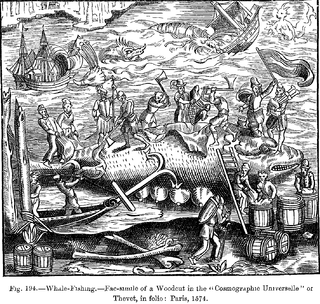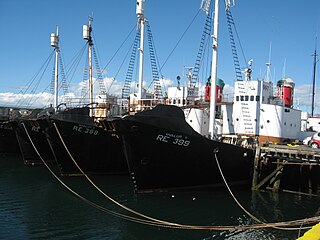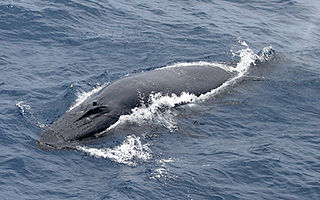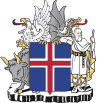
The International Convention for the Regulation of Whaling is an international environmental agreement aimed at the "proper conservation of whale stocks and thus make possible the orderly development of the whaling industry". It governs the commercial, scientific, and aboriginal subsistence whaling practices of 88 member states.

Whaling is the hunting of whales for their usable products such as meat and blubber, which can be turned into a type of oil that was important in the Industrial Revolution. Whaling was practiced as an organized industry as early as 875 AD. By the 16th century, it had become the principal industry in the Basque coastal regions of Spain and France. The whaling industry spread throughout the world and became very profitable in terms of trade and resources. Some regions of the world's oceans, along the animals' migration routes, had a particularly dense whale population and became targets for large concentrations of whaling ships, and the industry continued to grow well into the 20th century. The depletion of some whale species to near extinction led to the banning of whaling in many countries by 1969 and to an international cessation of whaling as an industry in the late 1980s.
Iceland took control of its foreign affairs in 1918 when it became a sovereign country, the Kingdom of Iceland, in a personal union with the King of Denmark. As a fully independent state, Iceland could have joined the League of Nations in 1920, but chose not to do so for cost reasons. It negotiated with Denmark to initially carry out most of its foreign relations, while maintaining full control. Denmark appointed a diplomatic envoy (Ambassador) to Iceland in 1919 and Iceland reciprocated in 1920, opening an embassy in Copenhagen. Iceland established its own Foreign Service in April 1940 when Denmark became occupied by Nazi Germany and ties between the two countries were severed. The Republic of Iceland was founded in 1944. The Icelandic foreign service grew slowly in the post-WWII period, but increased rapidly after the mid-1990s. Iceland's closest relations are with the Nordic states, the European Union and the United States. Iceland has been a member of the United Nations since 1946. Iceland was a founding member of the World Bank in 1946 and NATO in 1949. In terms of European integration, Iceland was a founding member of the OEEC in 1948 and the Nordic Council in 1952, it joined EFTA in 1970, was a founding member of the CSCE in 1973 and the EEA in 1992 and joined Schengen in 1996.
The International Whaling Commission (IWC) is a specialised regional fishery management organisation, established under the terms of the 1946 International Convention for the Regulation of Whaling (ICRW) to "provide for the proper conservation of whale stocks and thus make possible the orderly development of the whaling industry".
The polar archipelago of Svalbard was first discovered by Willem Barentsz in 1596, although there is disputed evidence of use by Pomors or Norsemen. Whaling for bowhead whales started in 1611, dominated by English and Dutch companies, though other countries participated. At that time there was no agreement about sovereignty. Whaling stations, the largest being Smeerenburg, were built during the 17th century, but gradually whaling decreased. Hunting was carried out from the 17th century by Pomors, but from the 19th century it became more dominated by Norwegians.
The High North Alliance is an umbrella organisation of several fishing, whaling and Nordic municipal councils. The organisation objectives are, it says, "to protect the rights of whalers, sealers and fishermen to harvest renewable resources in accordance with the principle of sustainable management."

Japanese whaling, in terms of active hunting of whales, is estimated by the Japan Whaling Association to have begun around the 12th century. However, Japanese whaling on an industrial scale began around the 1890s when Japan started to participate in the modern whaling industry, at that time an industry in which many countries participated.

This article discusses the history of whaling from prehistoric times up to the commencement of the International Whaling Commission (IWC) moratorium on commercial whaling in 1986. Whaling has been an important subsistence and economic activity in multiple regions throughout human history. Commercial whaling dramatically reduced in importance during the 19th century due to the development of alternatives to whale oil for lighting, and the collapse in whale populations. Nevertheless, some nations continue to hunt whales even today.

A whaler or whaling ship is a specialized vessel, designed or adapted for whaling: the catching or processing of whales.

Whaling in Iceland began with spear-drift hunting as early as the 12th century, and continued in a vestigial form until the late 19th century, when other countries introduced modern commercial practices. Today, Iceland is one of a handful of countries that formally object to an ongoing moratorium established by the International Whaling Commission in 1986, and that still maintain a whaling fleet. One company remains concentrated on hunting fin whales, largely for export to Japan, while the only other one previously hunted minke whales for domestic consumption until 2020, as the meat was popular with tourists. In 2018, Hvalur hf whalers killed a rare blue whale/fin whale hybrid.
Whaling in Norway involves hunting of minke whales for use as animal and human food in Norway and for export to Japan. Whale hunting has been a part of Norwegian coastal culture for centuries, and commercial operations targeting the minke whale have occurred since the early 20th century. Some still continue the practice in the modern day, within annual quotas.
Events in the year 1814 in Norway.
Events in the year 1905 in Norway.

Denmark and Norway have a very long history together: they were both part of the Kalmar Union between 1397 and 1523, and Norway was in a Union with Denmark between 1524 and 1814.

Johannes Klingenberg Sejersted was a Norwegian military officer.

Johan Bryde was a Norwegian businessman, ship owner and whaler. He helped establish a whaling station in the Colony of Natal. The Bryde's whale is named after him.

Norway-New Zealand relations are foreign relations between Norway and New Zealand. The two countries established diplomatic relations in 1905, after Norway gained independence. New Zealand's embassy in Stockholm, Sweden represents New Zealand diplomatically in Norway. Norway is represented in New Zealand by the Norwegian Embassy in Canberra, Australia. Around 1,400 Norwegians live in New Zealand and 929 New Zealanders live in Norway.

Anti-whaling refers to actions taken by those who seek to end whaling in various forms, whether locally or globally in the pursuit of marine conservation. Such activism is often a response to specific conflicts with pro-whaling countries and organizations that practice commercial whaling and/or research whaling, as well as with indigenous groups engaged in subsistence whaling. Some anti-whaling factions have received criticism and legal action for extreme methods including violent direct action. The term anti-whaling may also be used to describe beliefs and activities related to these actions.
Events in the year 1739 in Norway.

Commercial whaling in Britain began late in the 16th century and continued after the 1801 formation of the United Kingdom and intermittently until the middle of the 20th century.
















